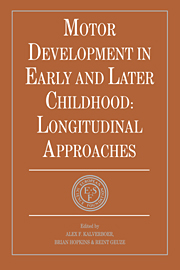Book contents
- Frontmatter
- Contents
- List of contributors
- Foreword
- Preface
- SETTING THE SCENE
- SECTION I BIOLOGICAL BASIS OF MOTOR DEVELOPMENT
- SECTION II DEVELOPMENT OF BODY POSTURE AND GOAL-DIRECTED REACHING
- SECTION III MOTOR DEVELOPMENT, EARLY COMMUNICATION AND COGNITION
- SECTION IV ACQUISITION OF SKILLS
- SECTION V MOTOR DEVELOPMENT AND HANDICAP
- SECTION VI METHODOLOGICAL AND CONCEPTUAL CONSIDERATIONS
- Epilogue: description versus explanation
- Index
Preface
Published online by Cambridge University Press: 05 May 2010
- Frontmatter
- Contents
- List of contributors
- Foreword
- Preface
- SETTING THE SCENE
- SECTION I BIOLOGICAL BASIS OF MOTOR DEVELOPMENT
- SECTION II DEVELOPMENT OF BODY POSTURE AND GOAL-DIRECTED REACHING
- SECTION III MOTOR DEVELOPMENT, EARLY COMMUNICATION AND COGNITION
- SECTION IV ACQUISITION OF SKILLS
- SECTION V MOTOR DEVELOPMENT AND HANDICAP
- SECTION VI METHODOLOGICAL AND CONCEPTUAL CONSIDERATIONS
- Epilogue: description versus explanation
- Index
Summary
This volume is concerned with the role of longitudinal studies in promoting understanding of the processes involved in motor development during childhood. It is the result of a workshop entitled ‘A longitudinal approach to the study of motor development in early and later childhood’, held in Groningen in June 1989 under the auspices of the European Science Foundation network on ‘The longitudinal study of individual development’. Here, researchers from quite different backgrounds and disciplines were brought together: behavioural end-ocrinologists, biologists, developmental neurologists and neuropaediatricians, clinical and developmental psychologists. Some participants were experimentally or methodologically oriented, others more practically so. They prepared and precirculated their papers which were intensively discussed and reviewed and which provided the basic material for this volume.
The organizers were aware that bringing such different scientific species together would imply a challenge as well as a risk. Participants were challenged to ‘cross their borders’ so as to test the limits of their principles and methodologies. Such an enterprise would, they hoped, result in creative discussions, leading to new openings and connections between disciplines concerned with, and relevant to, the study of motor development. However, there was a risk that participants would remain within the traditions of their own square disciplines, nobody taking any real profit from other people's insights and approaches. In our opinion, the first hurdle was successfully crossed and we hope that this volume reflects this outcome.
- Type
- Chapter
- Information
- Motor Development in Early and Later ChildhoodLongitudinal Approaches, pp. xv - xviiiPublisher: Cambridge University PressPrint publication year: 1993
- 1
- Cited by

